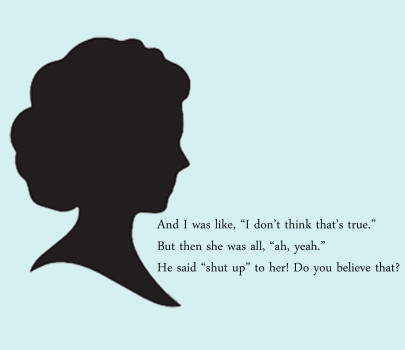I was like “language is evolving.”
November 13, 2013
“I was like ‘yeah,’ and then he was like ‘no,’ but then I was all ‘uh, yeah.'” Phrases like these are referred to as if they are the epitaph on the grave of the English language itself. As teenagers, we are often criticized, even mocked, for our speaking patterns; it’s as if the way we express our idea makes them less valid. This couldn’t be further from the truth. Dialects within certain groups, such as teenagers, can develop new phrases to serve specific functions. Within the groups who use these phrases, they make it easier to communicate ideas.
‘Said’ still has it’s place when indicating exact quotes. For instance, “She said ‘I forgot my homework last night because I got home so late after swimming.’”
Then there’s the most common dialogue tag within South’s halls – the infamous ‘was like.’ This has its uses, too. It shows that you’re giving an approximation of what someone said, without quoting them word-for-word. It can be thought of as a shortcut for “she said something like.” As in, “She was like ‘ahh, I forgot my homework because of swimming!'” Although she didn’t say exactly that, it clearly gets both the point and mood across. You’re making it clear that these were not her exact words, something that wouldn’t be obvious if you had used ‘said’ instead.
Why should someone be criticized for using ‘was like’ when they are saying exactly what they mean? She didn’t say exactly this, she said something very similar to it.
Finally, there’s ‘was all,’ which can show that you’re doing a much less exact imitation, parodying or exaggerating a statement. For example, “She was all ‘I didn’t do the homework because excuses, excuses.’”
Using phrases like this isn’t natural to adults, but that doesn’t mean that they are bad things for teenagers to be saying. In fact, they increase the flexibility of language. This is especially important for teenagers, who are still developing means of expression. These phrases facilitate conversation by allowing people to speak in inexact terms without stopping to make clarifications. This is especially good for teenagers because we’re still improving our ability to express ideas.
It’s natural for language to evolve this way – it’s not meant to be static. Different dialogue tags developed because they were necessary for communication in certain instances, and this is a good thing. The validity of statements should be judged on their content, not the way they’re expressed. The dialects people use have very little to do with their intelligence. Phrases that some would criticize as meaningless can actually increase clarity, and are only signs of language evolution.







Thor Paulson • Nov 19, 2013 at 10:21 pm
I would talk a lot more if I could relay a dialogue without having to say “was all like” every time someone talks.